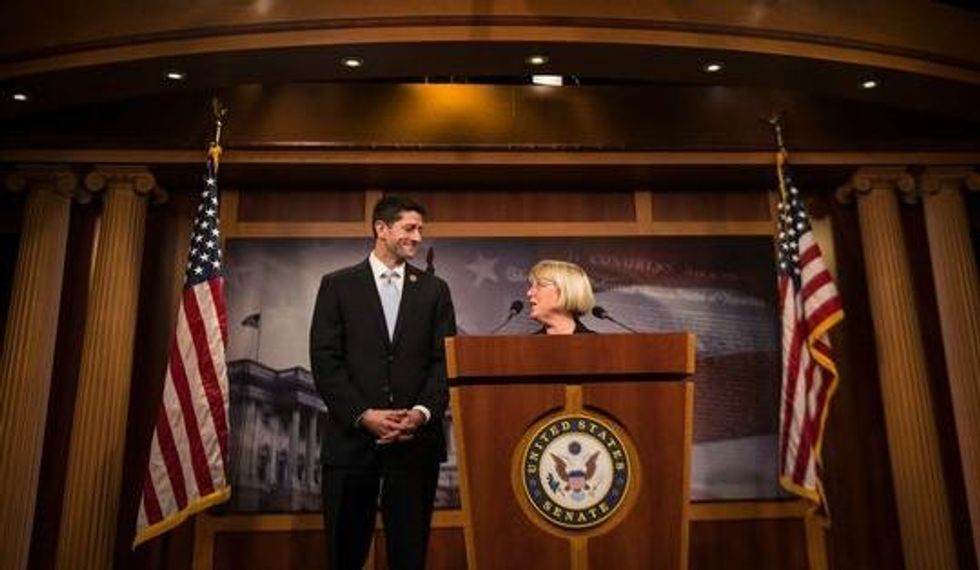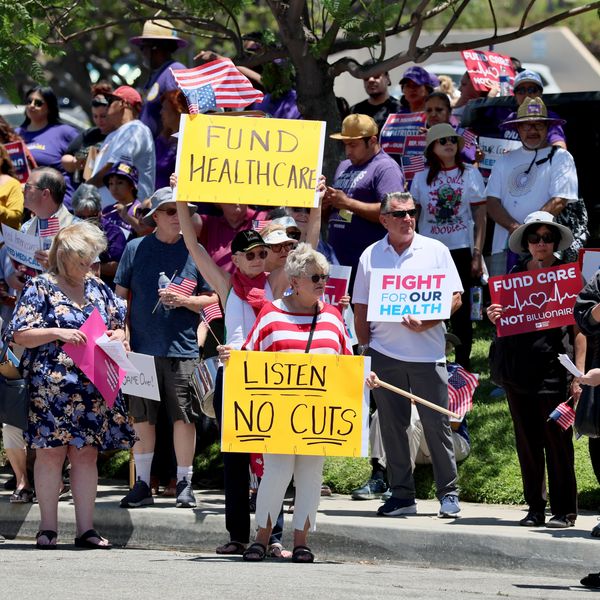Can't the NYT Print a Budget Article Without Editorializing About Cutting Social Security and Medicare?
The answer seems to be no.

"The deal, while modest in scope, amounts to a cease-fire in the budget wars that have debilitated Washington since 2011 and gives lawmakers breathing room to try to address the real drivers of federal spending -- health care and entitlement programs like Medicare and Social Security -- and to reshape the tax code."
It would be equally valid to say that the budget deal gives lawmakers breathing room to plan an attack in Freedonia. Addressing the "real drivers of federal spending" is the NYT's agenda, it is not in any obvious way the agenda of Congress. It is also not clear that this is accurate in any important way.
Social Security spending has risen by roughly one percentage point as a share of GDP since 2000. It is projected to rise by roughly the same amount over the next two decades due to the continued aging of the population. It is then projected to remain pretty much flat for the rest of the century. This does not suggest a problem in obvious need of fixing.
Medicare costs are projected to grow more rapidly due to the projected rise in per person health care spending in the private sector. This suggests a need to contain health care costs in the economy as a whole. In the last five years per person costs have grown only slightly more rapidly than per capita GDP. If this trend continues, then there is no need to have further measures containing Medicare costs even without any further increases in revenue or offsetting cuts elsewhere.
The piece also includes some mind reading, telling readers:
"The proposal quickly drew fire from conservatives who saw it as a retreat from earlier spending cuts and a betrayal by senior Republicans."
A reporter would write this sentence:
"The proposal quickly drew fire from conservatives who claimed to see it as a retreat from earlier spending cuts and a betrayal by senior Republicans."
An Urgent Message From Our Co-Founder
Dear Common Dreams reader, The U.S. is on a fast track to authoritarianism like nothing I've ever seen. Meanwhile, corporate news outlets are utterly capitulating to Trump, twisting their coverage to avoid drawing his ire while lining up to stuff cash in his pockets. That's why I believe that Common Dreams is doing the best and most consequential reporting that we've ever done. Our small but mighty team is a progressive reporting powerhouse, covering the news every day that the corporate media never will. Our mission has always been simple: To inform. To inspire. And to ignite change for the common good. Now here's the key piece that I want all our readers to understand: None of this would be possible without your financial support. That's not just some fundraising cliche. It's the absolute and literal truth. We don't accept corporate advertising and never will. We don't have a paywall because we don't think people should be blocked from critical news based on their ability to pay. Everything we do is funded by the donations of readers like you. Will you donate now to help power the nonprofit, independent reporting of Common Dreams? Thank you for being a vital member of our community. Together, we can keep independent journalism alive when it’s needed most. - Craig Brown, Co-founder |

"The deal, while modest in scope, amounts to a cease-fire in the budget wars that have debilitated Washington since 2011 and gives lawmakers breathing room to try to address the real drivers of federal spending -- health care and entitlement programs like Medicare and Social Security -- and to reshape the tax code."
It would be equally valid to say that the budget deal gives lawmakers breathing room to plan an attack in Freedonia. Addressing the "real drivers of federal spending" is the NYT's agenda, it is not in any obvious way the agenda of Congress. It is also not clear that this is accurate in any important way.
Social Security spending has risen by roughly one percentage point as a share of GDP since 2000. It is projected to rise by roughly the same amount over the next two decades due to the continued aging of the population. It is then projected to remain pretty much flat for the rest of the century. This does not suggest a problem in obvious need of fixing.
Medicare costs are projected to grow more rapidly due to the projected rise in per person health care spending in the private sector. This suggests a need to contain health care costs in the economy as a whole. In the last five years per person costs have grown only slightly more rapidly than per capita GDP. If this trend continues, then there is no need to have further measures containing Medicare costs even without any further increases in revenue or offsetting cuts elsewhere.
The piece also includes some mind reading, telling readers:
"The proposal quickly drew fire from conservatives who saw it as a retreat from earlier spending cuts and a betrayal by senior Republicans."
A reporter would write this sentence:
"The proposal quickly drew fire from conservatives who claimed to see it as a retreat from earlier spending cuts and a betrayal by senior Republicans."

"The deal, while modest in scope, amounts to a cease-fire in the budget wars that have debilitated Washington since 2011 and gives lawmakers breathing room to try to address the real drivers of federal spending -- health care and entitlement programs like Medicare and Social Security -- and to reshape the tax code."
It would be equally valid to say that the budget deal gives lawmakers breathing room to plan an attack in Freedonia. Addressing the "real drivers of federal spending" is the NYT's agenda, it is not in any obvious way the agenda of Congress. It is also not clear that this is accurate in any important way.
Social Security spending has risen by roughly one percentage point as a share of GDP since 2000. It is projected to rise by roughly the same amount over the next two decades due to the continued aging of the population. It is then projected to remain pretty much flat for the rest of the century. This does not suggest a problem in obvious need of fixing.
Medicare costs are projected to grow more rapidly due to the projected rise in per person health care spending in the private sector. This suggests a need to contain health care costs in the economy as a whole. In the last five years per person costs have grown only slightly more rapidly than per capita GDP. If this trend continues, then there is no need to have further measures containing Medicare costs even without any further increases in revenue or offsetting cuts elsewhere.
The piece also includes some mind reading, telling readers:
"The proposal quickly drew fire from conservatives who saw it as a retreat from earlier spending cuts and a betrayal by senior Republicans."
A reporter would write this sentence:
"The proposal quickly drew fire from conservatives who claimed to see it as a retreat from earlier spending cuts and a betrayal by senior Republicans."

